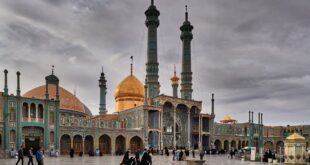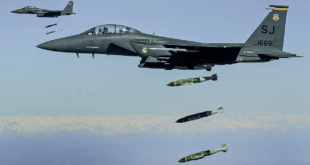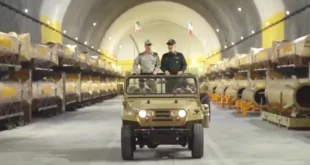 VIENNA (AFP) — Iran is insisting that it will not give up its nuclear rights, despite being given just “weeks” by world powers to suspend uranium enrichment or face the consequences.
VIENNA (AFP) — Iran is insisting that it will not give up its nuclear rights, despite being given just “weeks” by world powers to suspend uranium enrichment or face the consequences.
“Pressure by certain Western countries aiming to make us abandon our [nuclear] rights will not show results,” Iranian President Mahmoud Ahmadinejad said Friday, according to the official IRNA news agency in Tehran.
“Unfortunately, some countries that possess nuclear weapons arsenals… want to deprive us of our absolute rights,” he added.
The Iranian leader was responding to a joint initiative announced the previous day by the foreign ministers of the five permanent UN Security Council members, plus Germany, who offered Tehran a package of benefits if it suspends sensitive nuclear fuel work.
But the offer, issued after intense talks here, came conditioned with a threat of penalties, including UN sanctions, if Tehran refuses to suspend uranium enrichment and reprocessing — the core programmes in making nuclear fuel but what can also be used in atom bombs.
US Secretary of State Condoleezza Rice said Friday that Iran had only weeks to respond to the proposal of trade, security and technology incentives if Iran suspends uranium enrichment, which can be used to make nuclear reactor fuel but also nuclear weapons material.
Rice told the US television network NBC in Vienna: “We do need to have an answer and it can’t be months. It really needs to be within weeks.” No one was proposing a precise deadline for a positive response from Iran.
“There is no kind of ultimatum deadline, although I think we are talking about several weeks,” said Russian Foreign Minister Sergei Lavrov.
The foreign minister also refused to be drawn on what measures might be taken if Iran refused the international community’s proposals.
“At the moment we won’t guess because such guesses pour oil on the fire of emotional discussions and give a reason for those who want to destroy the possibility of a negotiated resolution,” he was quoted by the RIA-Novosti news agency as saying.
He added that the Vienna talks between Britain, China, France, Germany, Russia and the United States had ruled out any recourse to force as a way of resolving the crisis.
Russia opposes the use of force against Iran and believes it is “early” to discuss the possibility of sanctions, Russian President Vladimir Putin echoed Friday.
The United States, however, said independently that no option — including military action — is off the table in dealing with Iran.
The United States insisted that Iran had to suspend sensitive nuclear fuel work as a “non-negotiable” element of the deal hammered out by world powers, White House spokesman Tony Snow said.
British Foreign Secretary Margaret Beckett also gave no details of the package, but said late Thursday at the end of the meeting that “we are now talking to the Iranians about our proposals,” which are to be delivered to Tehran within days.
In Berlin, German Chancellor Angela Merkel called on Iran to seize what she called an “incredible opportunity.” The agreement by six of the world’s most powerful countries caps months of diplomacy during which the United States has tried to meet Russian and Chinese demands to avoid escalating the showdown.
US National Intelligence Director John Negroponte said in London that Iran appeared determined to make nuclear weapons and could develop such an arsenal as early as 2010.
US officials stressed the package offered had bite.
A draft proposal of the text seen by AFP includes helping Iran build light water reactors for its civilian nuclear energy programme.
According to this text, possible sanctions could include an arms embargo — something Russia, a key arms supplier to Iran, and China, a major consumer of Iranian oil, resist — but that sanctions would be targeted rather than a blanket boycott, economic or otherwise.
Beckett said that if Iran complied, the West “would suspend action in the Security Council,” where the United States and Europe seek sanctions against Iran.
If not, she warned, “further steps would have to be taken in the Security Council.”Š
 Eurasia Press & News
Eurasia Press & News



